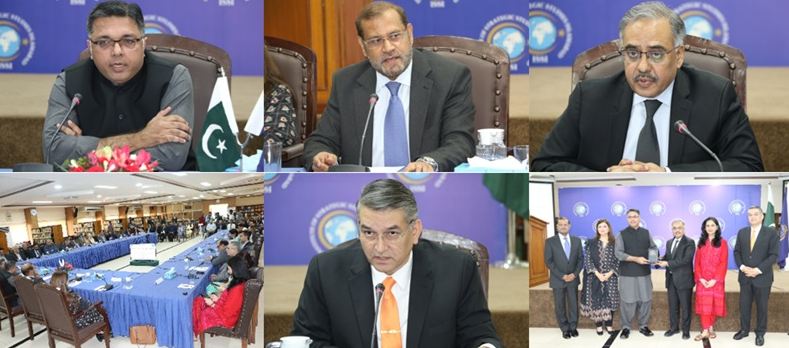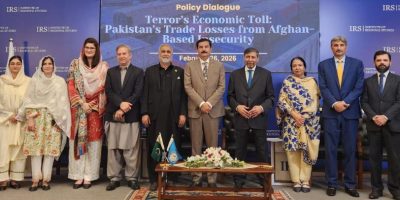ISSI hosts special talk on “Pakistan’s Investment Landscape: Challenges, Opportunities and Way Forward”

ISLAMABAD, OCT 4 /DNA/ – The China Pakistan Study Centre (CPSC) at the Institute of Strategic Studies Islamabad (ISSI) organized a Special Talk on “Pakistan’s Investment Landscape: Challenges, Opportunities and Way Forward.” The Guest Speaker on the occasion was Mr. Azfar Ahsan, former Minister of State & Chairman Board of Investment (BOI).
In his remarks at the outset, Director General ISSI Ambassador Sohail Mahmood outlined Pakistan’s unique advantages, emphasising the country’s strategic geographical location at the crossroads of key regions such as the Middle East, Central Asia, and South Asia. He pointed out that Pakistan’s youthful population provides an unmatched demographic advantage, while its vast natural resources make it an attractive destination for investors. Ambassador Sohail Mahmood also acknowledged the challenges preventing Pakistan from fully realising its investment potential. He noted that while Pakistan has made progress in improving its ease of doing business ranking, significant hurdles remain, including regulatory complexities and concerns about policy continuity. These factors, along with lingering perceptions of security issues, contribute to investor hesitation.
Despite these challenges, Ambassador Sohail Mahmood remained optimistic, highlighting sectors such as IT, agriculture, and textiles as ripe for enhanced investment. He underscored the importance of fostering trust and stability to attract long-term investments and called for collaboration among all stakeholders – including government institutions, private sector, business leaders, and the media and civil society – to create an environment conducive to sustainable growth and turn Pakistan into a truly attractive investment destination.
During his address, Mr. Azfar Ahsan stressed the critical need for a comprehensive strategy to attract both local and foreign investors. He emphasized that investment success in Pakistan hinges on supporting and facilitating existing investors, a crucial step toward creating a sustainable investment climate. He strongly advocated for a long-term national approach including framing of a “country strategy” to improve investor confidence and ensure economic stability. Furthermore, Mr. Ahsan highlighted the importance of foundational reforms across all sectors of the economy. He argued that Pakistan must move away from reactive policies and focus on creating a business- and investment-friendly environment. This requires consistent policy frameworks, regardless of political changes, as well as a commitment to improving infrastructure, governance, institutional capacity, and law and order. These efforts, he noted, would not only attract new foreign direct investment (FDI) but also strengthen relationships with existing investors, which was critically important.
Mr. Azfar Ahsan’s address also highlighted the potential for joint ventures between Pakistani and foreign investors, particularly in sectors like technology, agriculture, and manufacturing. Mr. Ahsan emphasized Pakistan’s strategic location and youthful population as key assets that could be leveraged for future growth. He encouraged policymakers to learn from neighboring countries such as China and Uzbekistan, where strategic planning and collaboration with global businesses have led to rapid economic development. He also emphasised the importance of imbibing from the Saudi experience and working closely with Saudi authorities to significantly expand the Kingdom’s investment profile in Pakistan.
Earlier, Director of the China Pakistan Study Centre Dr. Talat Shabbir, in his introductory remarks, highlighted Pakistan’s immense potential despite current economic challenges. He emphasized the role of Special Economic Zones (SEZs) established under the China-Pakistan Economic Corridor (CPEC) in attracting foreign investment by offering tax incentives and improved infrastructure.
In his concluding remarks, former Air Chief Marshal Sohail Aman (R) stressed the integral connection between security, stability, and economic prosperity, noting that Pakistan’s progress depends on creating an environment conducive to foreign investment. He emphasized the importance of a united approach, with leadership playing a pivotal role in fostering long-term economic stability.
The talk was attended by corporate leaders, senior civil servants, academics, practitioners, think tank experts, media personnel, and members of civil society.
Related News

Afghan instability costs Pakistan billions in trade losses: IRS
ISLAMABAD, MAR 4 /DNA/ – Speakers at a policy dialogue hosted by the Institute ofRead More

Ambassador Varga highlights strong potential for bilateral trade growth
ISLAMABAD, MAR 4 /DNA/ – Ambassador of Hungary Dr. Zoltan Varga has said that HungaryRead More


Comments are Closed